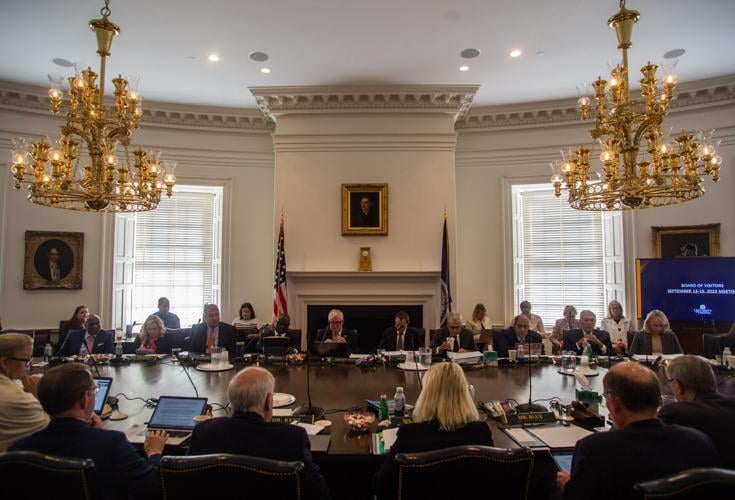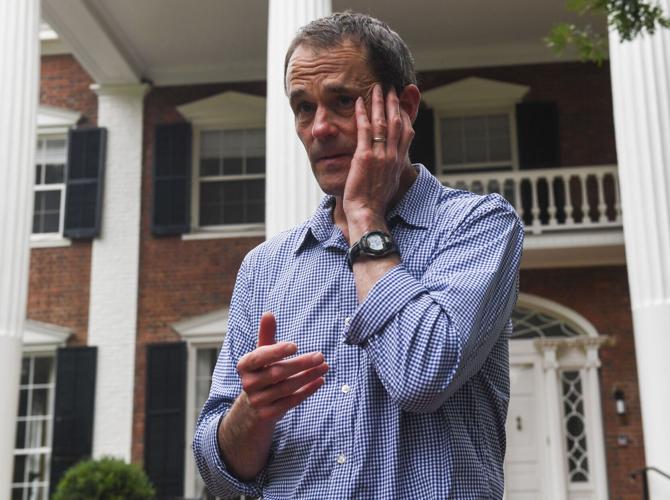CHARLOTTESVILLE — After more than an hour of debate at an emergency meeting Friday, the University of Virginia Faculty Senate held a vote of no confidence in the school's governing Board of Visitors for “not protecting the University and its president from outside interference, and for not consulting with the Faculty Senate in a time of crisis."
That crisis, referred to in the resolution the vote approved, refers to President Jim Ryan's resignation under pressure from the Trump administration Department of Justice.
The vote of no confidence passed with 46 in favor, six against and eight abstaining.
It was the first time the Faculty Senate, the 82-member body that represents UVa’s roughly 3,200 faculty members, has issued a resolution of no confidence in the board since President Teresa Sullivan’s ouster in 2012; and that vote was considered to be an unprecedented move at the time.
People are also reading…

The University of Virginia Board of Visitors holds a meeting in the Rotunda on Sept. 15, 2023.
The resolution passed Friday did make some unprecedented demands, namely that the committees searching for an interim and permanent president be 75% UVa faculty. That would be a significant uptick from the last time a presidential search committee was formed, in which only five of the 22 members were faculty.
On Friday, Faculty Senate Chair Jeri Seidman opened the debate on the resolution, which originally would have issued a censure instead of a vote of no confidence, by defining the difference between the two.
“A censure expresses a serious disagreement; a vote of no confidence expresses to the party in power that they need to convince the group that they deserve trust,” Seidman said.

Jeri Seidman, University of Virginia professor of commerce and chair of the Faculty Senate, addresses a crowd protesting UVa President Jim Ryan's resignation, June 27 in front of the Rotunda at UVa.
Faculty Sen. Michelle Kisliuk, a professor in UVa’s Department of Music, made the motion to change the wording of the resolution from censure to a vote of no confidence.
She pointed to the Board of Visitors’ lack of transparency in sharing details about the DOJ’s investigation into Ryan.
“Their responsibility is to consult and communicate with us, and if they'd done that from the outset, before there was any litigation or anything, then they would have done their duty,” Kisliuk told The Daily Progress after the meeting.
The university’s new rector, Rachel Sheridan, and vice rector, Porter Wilkinson, attended Friday's meeting and Wednesday's Senate’s Executive Council gathering. They did not appear in person, but rather via Zoom for both meetings.
“You are understandably frustrated by the lack of information to date,” Sheridan said, addressing the Faculty Senate before the vote on Friday. “I'm telling you that I, too, am sharing your frustration.”

Kisliuk
Sheridan said the board was under “very explicit instruction by our attorneys that we have limited ability to communicate about the details” until UVa reaches an agreement with the DOJ, at which point she said she would be able to share much more information.
Faculty Sen. Rich Hynes, UVa’s John Allan Love professor of law, proposed postponing the vote on the resolution of no confidence until the board could share those details.
Hynes declined Daily Progress requests for further comment.

Hynes
Kisliuk argued that the fact that the board had not provided more information was a good reason to take the vote.
“Even though we don't know everything that happened, and maybe they did something that we would agree to, we have no idea, and because we have no idea, we have to say no confidence,” Kisliuk said.
Kisliuk called Sheridan's claim she could not speak much due to legal advice was just an excuse, and she said she felt there were things that Sheridan and the board could share but were just choosing not to.
Sheridan did not immediately respond to Daily Progress inquiries.
Kisliuk is one of many who have blamed the board, which is now fully staffed by Republican Gov. Glenn Youngkin’s appointees, for not doing more to save Ryan and fight the DOJ.
Ryan tendered his resignation on June 27 after the New York Times reported the day before that the DOJ had been campaigning for him to step down over his failure to dismantle the diversity, equity and inclusion programs he had established at the school. Further, DOJ officials claimed Ryan misrepresented UVa’s efforts to eliminate the university’s DEI apparatus and accused him of rebranding programs instead of removing them.
While Ryan heralded DEI as a way to address and correct historical and systemic injustices and inequalities for minorities at UVa, his detractors have said DEI swings the pendulum too far in the other direction, sacrificing merit for minority status among students, faculty and staff.
President Donald Trump issued an executive order on April 23 demanding American colleges eliminate their DEI programs and policies. Trump’s administration has been explicit: Those that do not risk losing millions of dollars in federal funding.
“To make a long story short, I am inclined to fight for what I believe in, and I believe deeply in this University. But I cannot make a unilateral decision to fight the federal government in order to save my own job,” Ryan wrote in a letter to the university community the day he tendered his resignation. “If this were not so distinctly tied to me personally, I may have pursued a different path. But I could not in good conscience cause real and direct harm to my colleagues and our students in order to preserve my own position.”

University of Virginia President Jim Ryan speaks to a crowd protesting his resignation, Friday, June 27, 2025, at Carr’s Hill on UVa Grounds.
Concerning Ryan's replacement, the Faculty Senate's resolution Friday calls on the Board of Visitors to "actively safeguard principles of academic freedom for the University and its faculty and endeavor to protect the University from outside influences seeking improperly to shape it."
Kisliuk said this was a safeguard to hopefully prevent the board from “pulling a fast one” and appointing a candidate picked by the Trump administration.
She named former Virginia Attorney General Ken Cuccinelli as an example of someone she thought may be on their short list.

Ken Cuccinelli listens during a House Oversight and Accountability Committee hearing, Wednesday, June 7, 2023, on Capitol Hill in Washington, D.C.
Democrats in the state Senate are currently feuding with the governor’s office after a Senate panel refused to confirm Youngkin’s appointment of Cuccinelli to the Board of Visitors.
Cuccinelli continues to attend board meetings, but the Senate’s top Democrats have filed a preliminary injunction that would block Cuccinelli from joining the board until the matter can be resolved, either in court or in the legislature.
So far, Sheridan has not given any names of potential candidates, but at both the Faculty Senate Executive Council on Wednesday and the full Senate meeting on Friday, she expressed a desire for the interim president to be an internal hire.
On Wednesday, Wilkinson said the board was hoping to set up a website where anyone in the university community could submit recommendations for both the interim and full-time presidents, but Friday, she said the board had opted for an email address, nominations@virginia.edu, to receive recommendations and also broader commentary about the search process.




















